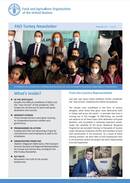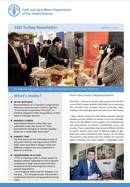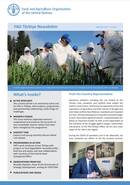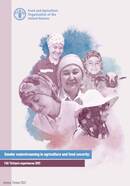Publications
The 7th issue of the FAOTURN, and the last issue for 2021, mainly focused on the outputs of the projects that FAO in Turkey had implemented. In this regard, you can find the detailed progress and the check balance of the projects for 2021. In the last period of the last year, we have witnessed important progress in the projects that have been implemented under the Syrian Refugees Resilience Program. Especially the job fairs and the outputs of these activities can inspire the colleagues.
As always, women empowerment was the main goal of improving the sector. To cope with the effect of the climate crisis was also a top priority for us. In this issue, readers can find great efforts for preventing land degradation. And we are gladly announcing that a participant from Turkey, Gülden Başaran, is among the 12 finalists of the World Food Day Poster Contest 2021, having obtained second place in the 16-19 age category. And finally, in this issue, Vladimir Olegovich Rakhmanin, FAO Assistant Director-General and Regional Representative for Europe and Central Asia, wrote for the FAO-Turkey Newsletter.
In the first issue of the second year of FAOTURN, readers will find details of a major initiative to empower women, the invisible protagonists of the food and agriculture sector. FAO, which prioritizes the organization of women and their further professional competence, has established more than 30 women's cooperatives in Turkey for this purpose so far. We have also taken the first step towards establishing a common digital network to ensure that these cooperatives reach both national and international markets. In this issue, the details of our digital platform initiative, which we started with the 'HepYerinden' brand, stand out. We are also reaping the fruits of our work aimed at integrating Syrians under Temporary Protection and host communities and increasing their livelihoods. In addition, the fight against the effects of climate change and IYAFA events are also included in the eighth issue of FAOTURN.
In the headline of the ninth issue of the FAO Türkiye newsletter, there is news about the activities of ongoing projects throughout Türkiye in the last three months. In addition, as in each issue, a guest author evaluates the projects carried out with FAO Turkey and the cooperation with the government of Turkey. In the power of women section, there is another interesting success story of two women farmers.
The photo that adorns our back cover in this issue is from a women's cooperative supported by our work in the Konya-Karaman basin.
In addition, the latest developments in the LDN project and developments from joint programs conducted with Central Asian countries are also included in this issue.
We are all connected! From our food to our cultures, environment and economies, we live in a globalized world. Climate change, conflict and inequality can often leave groups of people behind because of who they are or where they live. Building a better, more sustainable future for all means no one can be left behind. Find out how you can take action and be part of the change with the World Food Day Activity Book.
FAO Türkiye, in line with its overall mandate, supports the Turkish Government in close collaboration and synergy with line ministries, UN agencies, international organizations, civil society organizations, academia, and the private sector to strengthen three priority areas: food and nutrition security and safety; sustainable forest and natural resources management, including fisheries; and institutional capacity enhancement of the public and private sectors. Gender is one of the crosscutting themes that is mandatorily mainstreamed within all projects and regular work under the above-mentioned priority areas. FAO Türkiye’s actions for the implementation of gender commitments are guided by the FAO Policy on Gender Equality 2020–2030 which recognizes that persistent inequalities between women and men constitute a major obstacle to agriculture and rural development; and that eliminating these disparities is essential to building sustainable and inclusive food systems and resilient and peaceful societies. The implementation of equality goals and targets are the shared responsibility of line ministries, other government offices and civil society organizations.





